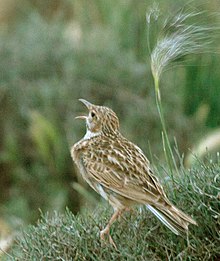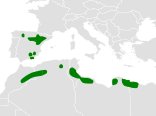Dupont's lark
| Dupont's lark | |
|---|---|

| |
| Scientific classification | |
| Domain: | Eukaryota |
| Kingdom: | Animalia |
| Phylum: | Chordata |
| Class: | Aves |
| Order: | Passeriformes |
| Family: | Alaudidae |
| Genus: | Chersophilus Sharpe, 1890 |
| Species: | C. duponti
|
| Binomial name | |
| Chersophilus duponti (Vieillot, 1824)
| |

| |
| Synonyms | |
| |
Dupont's lark (Chersophilus duponti) is a species of lark in the family Alaudidae of the monotypic genus Chersophilus. It is found in northern Africa and Spain.
Taxonomy and systematics
[edit]Dupont's lark was originally described by Louis Pierre Vieillot in 1820 and placed in the genus Alauda.[2][3] It was named for the French naturalist Léonard Puech Dupont, who had collected the species and showed it to Vieillot.[4]
Subspecies
[edit]Two subspecies are recognized:[5]
- North-western Dupont's lark (C. d. duponti) - (Vieillot, 1824): Found in southern Spain, northern Morocco, northern Algeria and northern Tunisia
- South-eastern Dupont's lark (C. d. margaritae) - (Koenig, AF, 1888): Originally described as a separate species in the genus Alaemon. Found from central Algeria to western Egypt
Description
[edit]Like most other larks, Dupont's lark is an undistinguished looking species on the ground. It is 17–18 cm long, slim, with a long neck, long legs and a fine slightly curved bill. It has a thin pale crown stripe and a dark-streaked breast. The north-western Dupont's lark of Europe and north-west Africa is mainly brown-grey above and pale below. The south-eastern Dupont's lark, which occupies most of the rest of the African range, has rufous upperparts.
Vocalisations
[edit]Its song is a repeated thin, melancholic whistling phrase, very ventriloquial (difficult to locate) and a nasal whistle given mainly at dawn and dusk or at night.
Distribution and habitat
[edit]It breeds across much of northern Africa, from Algeria to Egypt, and in Spain.[1] It is a non-migratory resident. It is a species that commonly inhabits chaparral areas.[6] However, it experiences a 3.9% annual population decrease in Spain with a 32.8% decrease from 2008 to 2018, shifting its conservation status to vulnerable on the national level and endangered in the regions of Andalusia and Castile-León.[7]
Behaviour and ecology
[edit]This is a very shy species, which runs for cover when disturbed. It is difficult to see while running among vegetation but it sometimes sings, standing upright on the edge of a low bush.
Breeding
[edit]
This is a bird of open sandy semi-desert or steppe with some grass. Its nest is on the ground, with three or four eggs being laid. Its food is seeds and insects.
References
[edit]- ^ a b BirdLife International (2020). "Chersophilus duponti". IUCN Red List of Threatened Species. 2020: e.T22717380A173711498. doi:10.2305/IUCN.UK.2020-3.RLTS.T22717380A173711498.en. Retrieved 19 November 2021.
- ^ Vieillot, Louis Pierre (1820) Faune française, ou Histoire naturelle, générale et particulière des animaux qui se trouvent en France, constamment ou passagèrement, à la surface du sol, dans les eaux qui le baignent, et dans le lit, pages 173-174 (in French)
- ^ "Chersophilus duponti - Avibase". avibase.bsc-eoc.org. Retrieved 16 December 2016.
- ^ Beolens, Bo; Watkins, Michael; Grayson, Michael (2014). The Eponym Dictionary of Birds. New York, NY, USA: Bloomsbury Publishing. ISBN 978-1-4729-0574-1.
- ^ "IOC World Bird List 6.4". IOC World Bird List Datasets. doi:10.14344/ioc.ml.6.4.
- ^ García Antón, Alexander; Garza, Vicente; Hernández Justribó, Jorge; Traba, Juan (15 February 2019). Arlettaz, Raphaël (ed.). "Factors affecting Dupont´s lark distribution and range regression in Spain". PLOS ONE. 14 (2): e0211549. Bibcode:2019PLoSO..1411549G. doi:10.1371/journal.pone.0211549. ISSN 1932-6203. PMC 6377091. PMID 30768612.
- ^ Gómez-Catasús, Julia; Pérez-Granados, Cristian; Barrero, Adrián; Bota, Gerard; Giralt, David; López-Iborra, Germán M.; Serrano, David; Traba, Juan (19 September 2018). "European population trends and current conservation status of an endangered steppe-bird species: the Dupont's lark Chersophilus duponti". PeerJ. 6: e5627. doi:10.7717/peerj.5627. ISSN 2167-8359. PMC 6151120. PMID 30258721.
External links
[edit]- Ageing and sexing by Javier Blasco-Zumeta & Gerd-Michael Heinze Archived 22 February 2019 at the Wayback Machine

